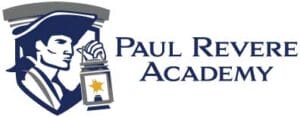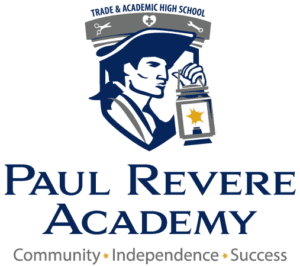What does a student look like that graduates from Paul Revere Academy? We have created this “Portrait of a Graduate” to show you what type of student (we call them scholars) look like. A PRA graduate is someone who is academically strong, technically skilled, historically informed, and deeply committed to the values and responsibilities of American citizenship, ready to contribute meaningfully to society and thrive in their future endeavors!
1. Academic Excellence
- Critical Thinking and Problem-Solving: Ability to analyze and address complex issues with sound reasoning and creativity.
- Mastery of Core Academic Subjects: Strong proficiency in subjects like mathematics, science, language arts, and history.
- Lifelong Learning: A passion for continuous learning and self-improvement, with an appreciation for the pursuit of knowledge.
2. Career and Technical Competence
- Industry-Recognized Certifications: Achievement of career/technical certifications that are respected and valued in the job market (e.g., IT, healthcare, engineering, trades).
- Hands-On Practical Skills: Ability to apply technical knowledge in real-world settings through internships, apprenticeships, or vocational training.
- Career Readiness: Preparedness for the workforce with skills in job search, resume writing, interviewing, and professional conduct.
3. American History and Civic Awareness
- Deep Understanding of American History: A thorough knowledge of American history, including key events, figures, and the founding principles of the United States.
- Civic Responsibility: A strong sense of civic duty and an understanding of the rights and responsibilities of American citizenship.
- Patriotism and Love of Country: A deep appreciation for the values and freedoms that America represents, with a commitment to contributing positively to the country’s future.
4. Personal and Social Responsibility
- Strong Work Ethic: Demonstrated commitment to hard work, perseverance, and reliability in academic, personal, and professional endeavors.
- Ethical Leadership: Ability to lead with integrity, make principled decisions, and inspire others within the community.
- Respect for Diversity and Inclusivity: Recognition and appreciation for the diverse backgrounds and perspectives that contribute to the richness of American society.
5. Effective Communication
- Oral and Written Communication Skills: Proficiency in articulating ideas clearly and effectively in both spoken and written forms.
- Teamwork and Collaboration: Ability to work well with others, contribute to group efforts, and respect differing viewpoints.
- Digital Literacy: Competence in using technology and digital platforms for communication, research, and problem-solving.
6. Emotional and Social Intelligence
- Self-Awareness and Emotional Regulation: Understanding of one’s own emotions and the ability to manage them effectively in various situations.
- Empathy and Interpersonal Skills: Capacity to understand and connect with others, fostering strong and positive relationships.
- Resilience and Adaptability: Ability to recover from setbacks, face challenges with confidence, and adapt to new circumstances.
7. Community Engagement and Citizenship
- Active Community Participation: Engagement in community service, civic activities, or other initiatives that support and enhance the local community.
- National Awareness: Understanding of America’s role in the world, with a commitment to contributing to the nation’s progress and international standing.
- Environmental Stewardship: Awareness of environmental issues and a dedication to sustainable practices that benefit both the local and global environment.
8. College and Career Preparedness
- Goal-Oriented Planning: Development of clear, realistic post-secondary goals and a strategic plan to achieve them, whether through college, vocational training, or direct entry into the workforce.
- Financial Literacy: Knowledge of personal finance, including budgeting, saving, and understanding the financial implications of educational and career choices.
- Independent Learning and Research Skills: Ability to take initiative in learning, conduct independent research, and apply knowledge effectively in new contexts.









Leave A Comment